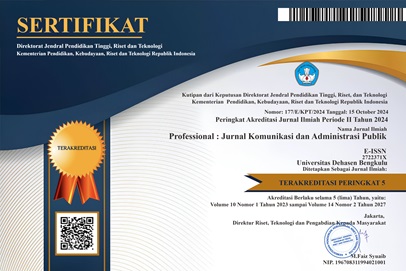ANALISIS IMPLEMENTASI PERDA RENCANA TATA RUANG WILAYAH DALAM MEWUJUDKAN PEMBANGUNAN BERKELANJUTAN BERWAWASAN LINGKUNGAN DI KABUPATEN BENGKULU TENGAH
Abstract
This scientific research was conducted to find out the description of the implementation of the Regional Regulation on Regional Spatial Planning in realizing environmentally sustainable development in Bengkulu Tengah Regency. The focus of this research is on the implementation of the policy of providing Green Open Space in the development of urban areas, namely the City Parks that have been built. The method used in this study uses descriptive qualitative methods with a case study approach. Data analysis is based on techniques commonly used in communication messages, namely data collection, data classification, data interpretation and meaning of research results. The results of the study were viewed from four aspects, namely the determination of zoning, licensing issues, choice of incentives and disincentives, and community participation. From this aspect, it is known that in the construction of City Parks as a form of implementation of the policy of providing Green Open Space in the development of urban areas in Bengkulu Regency, the principle of environmentally sustainable development has not been maximally realized. First, the determination of City Park zoning is carried out unilaterally by the government without coordinating with the community. Secondly, the issue of licensing where the construction of the City Park permit location is unknown to the public. Third, the choice of incentives and disincentives provided by the government is still too small and does not prioritize the interests of the community. Finally, the participation of the community in the construction of the City Park is still very lacking because the government is not transparent regarding the development planning that will be carried out.





